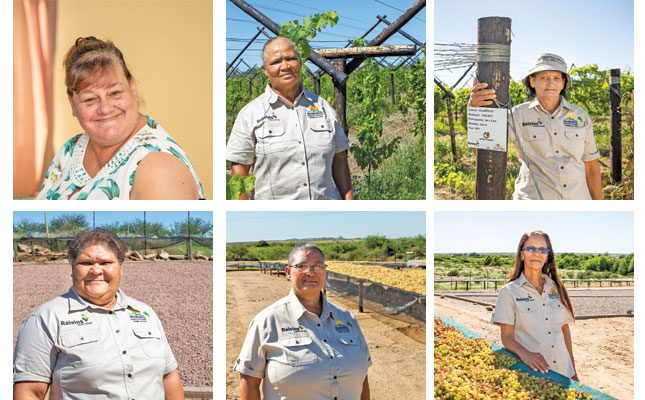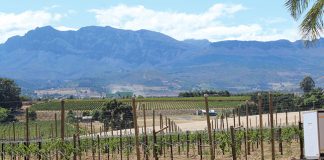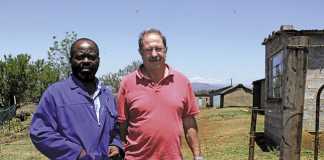
Photo: Raisins SA
The Eksteenskuil community originated in the early 1920s, when the first families settled on about 2 000ha in the Lower Orange River region, near Keimoes in the Northern Cape.
The area, which has about 630ha under flood irrigation from the Orange River, initially splintered into about 200 small plots, but by the 1970s these had been consolidated into 147 plots, of about 3,9ha each.
Filomaine Schwartz, office manager of the Eksteenskuil Agricultural Co-operative, says government allocated the
land to community members in 2003, but about 47 of the original 250 title deeds still need to be transferred.
“Without title deeds, many of our members are stuck. They don’t have money to produce anything and are unable to obtain loans without collateral. Eksteenskuil Agricultural Co-operative tries to bridge this gap by applying for grants and financing for the group as a whole.”
Thanks to this, the majority of its members are able to make a decent living. Indeed, some are doing so well that they have been able to increase their area under production by buying out plots from neighbours as well as on the open market.
“In the absence of title deeds, sales contracts are used during these transactions, stipulating that the deed should be transferred to the new owner as soon as the previous owner receives it. As a result of this, the co-operative currently has 112 members, ranging between the ages of 50 and 80, with a few young ones now also joining in,” says Schwartz.
Partnerships
Farmer’s Weekly previously reported on the way in which Eksteenskuil Agricultural Co-operative added value to the community through various partnerships.
Between 2012 and 2019, the Department of Agriculture in the Northern Cape established 74ha of vineyards, adding about 10ha each year. It also supplied essential implements, such as tractors and sprayers. In all, 61 farmers were set up in this way.
Between 2014 and 2017, the Industrial Development Corporation (IDC) funded, via the Jobs Fund, the establishment of 222ha of grapes in the area at a cost of R261 million, and institutions such as the Agricultural Research Council, Vinpro and Stellenbosch University provided training to improve the production, financial and social skills of the farmers.
The co-operative was Fairtrade-accredited in 1995, which allowed its members to sell raisins at a premium under the Fairtrade label.
Unfortunately, their buyer, Tradecraft, went bankrupt in 2018, resulting in members losing the extra R1,10/kg they were earning due to the accreditation. At this point, Raisins SA stepped in and started supporting the co-operative.
“Raisins South Africa [Raisins SA] didn’t want us to close our doors, as they felt we played an essential role in managing our members’ admin and unlocking growth opportunities for them,” recalls Schwartz.
Women’s project
In 2021, Raisins SA initiated (amongst others) a women’s project in partnership with Carpe Diem Raisins aimed at strengthening production of the co-operative’s 28 female members. Schwartz explains that Raisins SA assesses the needs of the women and tries to help seven at a time.
The first group have had their vineyards replaced and expanded, and received inputs to maintain these until they are commercially viable. They were also given mats for drying the grapes. Schwartz points out that it is difficult for the farmers to dry their grapes at a central point, as Eksteenskuil stretches over a huge area and is separated into a number of ‘islands’ by the river.
Raisins SA also initiated a week of intensive training for women in a project called Trade Forward Southern Africa.
“The training not only focused on production and financial skills, but also on helping the women build up their confidence so they could become more assertive in their business transactions. Most of our women are quite shy,” Schwartz explains.
Adeline Pieterse, one of the beneficiaries, received 0,6ha of Selma Pete and 0,3ha of Merbein grapes, as well as inputs to cover production costs until the vineyards are commercially viable (about three years from now). This has expanded her family’s production to 3,5ha.
Pieterse says she has no option but to farm, as she has to look after her father, who is older than 90 and suffers from dementia, and his land.
“Under normal conditions, the vineyards give a good income, but our production has been down for the past three seasons due to heavy rains and flood damage,” she adds.
Pieterse says community members help each other where they can. “Smallholder farmers can’t afford to live in parallel; they have to help one another out.”
Katriena Kok, another beneficiary, says she has to provide for her three sons with the income she makes from raisin production.
“The one used to work in the vineyards from an early age, but has fallen sick and cannot work anymore. One of the others is unemployed. He helps me on the farm, but it’s all new to him, so he needs a lot of training.”
Kok received raised drying mats from the Raisins SA project and is awaiting more mats this year. “Raised beds work much better than the old beds on the floor that I used to have, because the raisins are much cleaner. The mats also reduce the damage caused by ants and rain.”
She says the Department of Agriculture recently provided equipment, such as tractors, slashers and spray pumps for the women, but most of this equipment is unsuitable for vineyard work.
“We’ve asked the department to exchange it for vineyard tractors and sprayers.”
Kok also benefitted from an R80 000 loan last year to help her pay workers during the pruning season.
“I employ 10 to 12 people in the pruning and harvesting season. Everybody who works on the farm lives nearby, so they can go home for lunch and tea.”
How members benefit
Each member pays R1 000 per year to belong to the co-operative and share in its benefits. The co-operative uses strict criteria to decide who will benefit from grants and other initiatives.
These criteria include the length of membership and active membership, whether the member owns or rents land, and whether the member will be actively farming.
“We have these criteria in writing to create transparency and avoid conflict in the community,” says Schwartz.
Members can also rent farming equipment, which is serviced and maintained by the co-operative, at a minimal fee.
Payments are due only once the income from the harvest is received. Operators are available to drive the machinery for those farmers who are unable to do so themselves.
Farmers who receive grants are asked to plough 5% of the amount back into the community. Schwartz points out that this money is used primarily to help out farmers whose farms are too small to qualify for aid.
The community is highly family-orientated, and Schwartz says many people help one another to pick grapes in order to reduce their overheads.
The high quality soil of the area also helps the farmers save money, as it enables them to produce grapes with relatively few inputs.
There are few buyers in the region, so farmers deliver the dried grapes to wherever they can sell them.
According to the co-operative’s calculations, fresh grapes lose a quarter of their weight when dried. Over the past decade, prices for dried grapes, assuming that 80% are choice grade, have fluctuated between R10 496/t and R17 384/t.
Schwartz says farmers can make a decent living from about 3ha. “Vegetables will never be as lucrative as raisins over here, because we cannot compete with commercial producers. However, most of the Eksteenskuil producers have vegetable gardens and some sheep, cattle or goats for household use.”
Plans for the future
The co-operative recently approached the IDC for help in buying a commercial farm. “The IDC wasn’t against helping us, but doesn’t work with co-operatives. We’re therefore planning to establish a subsidiary company through which we’ll buy the farm.”
IDC support would be part loan, part grant, with no interest charged on the loan.
The co-operative has already earmarked a 40ha commercial raisin farm near Keimoes. Schwartz explains that they cannot buy in Eksteenskuil, as the land is too fragmented to create one large commercially viable unit.
“Our plan is to improve the income of our members by giving them shares in the company. This would also improve the financial viability of the co-operative and allow us to offer more services, such as negotiating or facilitating bulk-buying to reduce farmers’ input costs.”
Email Filomaine Schwartz at [email protected].










